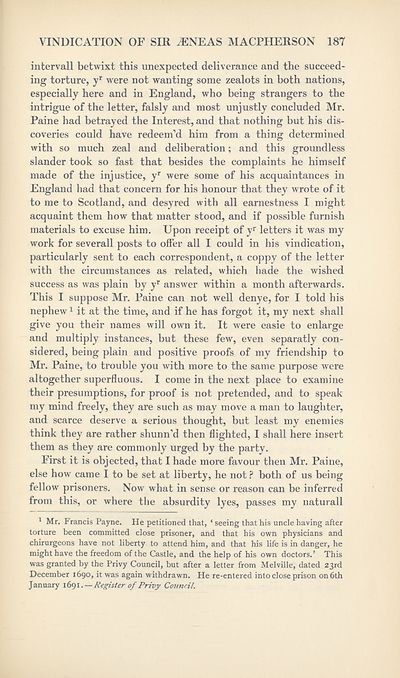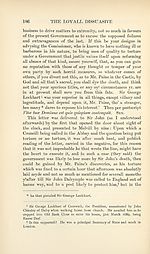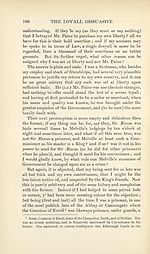Series 1 > Loyall dissuasive
(306) Page 187
Download files
Complete book:
Individual page:
Thumbnail gallery: Grid view | List view

VINDICATION OF SIR iENEAS MACPHERSON 187
intervall betwixt this unexpected deliverance and the succeed¬
ing torture, yr were not wanting some zealots in both nations,
especially here and in England, who being strangers to the
intrigue of the letter, falsly and most unjustly concluded Mr.
Paine had betrayed the Interest, and that nothing but his dis¬
coveries could have redeem’d him from a thing determined
with so much zeal and deliberation; and this groundless
slander took so fast that besides the complaints he himself
made of the injustice, yr were some of his acquaintances in
England had that concern for his honour that they wrote of it
to me to Scotland, and desyred with all earnestness I might
acquaint them how that matter stood, and if possible furnish
materials to excuse him. Upon receipt of yr letters it was my
work for severall posts to offer all I could in his vindication,
particularly sent to each correspondent, a coppy of the letter
with the circumstances as related, which hade the wished
success as was plain by yr answer within a month afterwards.
This I suppose Mr. Paine can not well denye, for I told his
nephew1 it at the time, and if he has forgot it, my next shall
give you their names will own it. It were easie to enlarge
and multiply instances, but these few, even separatly con¬
sidered, being plain and positive proofs of my friendship to
Mr. Paine, to trouble you with more to the same purpose were
altogether superfluous. I come in the next place to examine
their presumptions, for proof is not pretended, and to speak
my mind freely, they are such as may move a man to laughter,
and scarce deserve a serious thought, but least my enemies
think they are rather shunn’d then flighted, I shall here insert
them as they are commonly urged by the party.
First it is objected, that I hade more favour then Mr. Paine,
else how came I to be set at liberty, he not ? both of us being
fellow prisoners. Now what in sense or reason can be inferred
from this, or where the absurdity lyes, passes my naturall
1 Mr. Francis Payne. He petitioned that, ‘ seeing that his uncle having after
torture been committed close prisoner, and that his own physicians and
chirurgeons have not liberty to attend him, and that his life is in danger, he
might have the freedom of the Castle, and the help of his own doctors.’ This
was granted by the Privy Council, but after a letter from Melville, dated 23rd
December 1690, it was again withdrawn. He re-entered into close prison on 6th
January 1691.—Register of Privy Council.
intervall betwixt this unexpected deliverance and the succeed¬
ing torture, yr were not wanting some zealots in both nations,
especially here and in England, who being strangers to the
intrigue of the letter, falsly and most unjustly concluded Mr.
Paine had betrayed the Interest, and that nothing but his dis¬
coveries could have redeem’d him from a thing determined
with so much zeal and deliberation; and this groundless
slander took so fast that besides the complaints he himself
made of the injustice, yr were some of his acquaintances in
England had that concern for his honour that they wrote of it
to me to Scotland, and desyred with all earnestness I might
acquaint them how that matter stood, and if possible furnish
materials to excuse him. Upon receipt of yr letters it was my
work for severall posts to offer all I could in his vindication,
particularly sent to each correspondent, a coppy of the letter
with the circumstances as related, which hade the wished
success as was plain by yr answer within a month afterwards.
This I suppose Mr. Paine can not well denye, for I told his
nephew1 it at the time, and if he has forgot it, my next shall
give you their names will own it. It were easie to enlarge
and multiply instances, but these few, even separatly con¬
sidered, being plain and positive proofs of my friendship to
Mr. Paine, to trouble you with more to the same purpose were
altogether superfluous. I come in the next place to examine
their presumptions, for proof is not pretended, and to speak
my mind freely, they are such as may move a man to laughter,
and scarce deserve a serious thought, but least my enemies
think they are rather shunn’d then flighted, I shall here insert
them as they are commonly urged by the party.
First it is objected, that I hade more favour then Mr. Paine,
else how came I to be set at liberty, he not ? both of us being
fellow prisoners. Now what in sense or reason can be inferred
from this, or where the absurdity lyes, passes my naturall
1 Mr. Francis Payne. He petitioned that, ‘ seeing that his uncle having after
torture been committed close prisoner, and that his own physicians and
chirurgeons have not liberty to attend him, and that his life is in danger, he
might have the freedom of the Castle, and the help of his own doctors.’ This
was granted by the Privy Council, but after a letter from Melville, dated 23rd
December 1690, it was again withdrawn. He re-entered into close prison on 6th
January 1691.—Register of Privy Council.
Set display mode to:
![]() Universal Viewer |
Universal Viewer | ![]() Mirador |
Large image | Transcription
Mirador |
Large image | Transcription
Images and transcriptions on this page, including medium image downloads, may be used under the Creative Commons Attribution 4.0 International Licence unless otherwise stated. ![]()
| Scottish History Society volumes > Series 1 > Loyall dissuasive > (306) Page 187 |
|---|
| Permanent URL | https://digital.nls.uk/127550677 |
|---|
| Attribution and copyright: |
|
|---|
| Description | Over 180 volumes, published by the Scottish History Society, containing original sources on Scotland's history and people. With a wide range of subjects, the books collectively cover all periods from the 12th to 20th centuries, and reflect changing trends in Scottish history. Sources are accompanied by scholarly interpretation, references and bibliographies. Volumes are usually published annually, and more digitised volumes will be added as they become available. |
|---|


